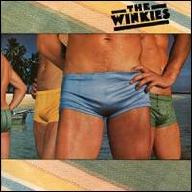His group, the Winkies, meanwhile, were integral to Brian Eno's plans following his departure from Roxy Music, while the band's own recordings so expertly straddle the preoccupations of the time that it would be no exaggeration to describe them as one of '70s rock's greatest lost opportunities. They really were that good.
Canadian-born Rambow arrived in London in 1973, following stints with the New York-based band Saturday Night. Forming the Winkies with ex-Holy Rollers guitarist Guy Humphreys and the rhythm section of Brian Torrington and Mike Desmaris, his outrageous stage persona immediately attracted attention -- a pub rock band in glam rock clothing, the Winkies were everything that their compatriots on the bar scene weren't: blatant, theatrical, and flashy as hell.
It was this which drew the interest of Eno, as he prepared to launch his first solo album, Here Come the Warm Jets onto a public which still regarded him in terms of his achievements with Roxy Music -- a conception which the album itself was not likely to disavow them of. Impressed by the Winkies' performance, he adopted them as his backing band and, in February 1974, launched out on his first (and, as it transpired, only) solo tour. The outing ended after just five shows, after Eno was rushed to the hospital suffering from a collapsed lung -- the only surviving evidence of the collaboration is a BBC radio session taped for John Peel in March 1974 and featuring distinctive versions of Eno's own Paw Paw Negro Blowtorch and Baby's on Fire, plus the Peggy Lee standard Fever.
The brevity of the union notwithstanding, the Winkies time with Eno slammed them into the limelight; by late spring, the band had signed with Chrysalis and was recording their debut album with producer Leo Lyons of Ten Years After. His bandmate Chick Churchill guested on the record, while Eno also put in an appearance on one track. Sadly, the album was never completed; instead, the Winkies began work on another set, this time with maverick Guy Stevens at the helm. The Winkies finally appeared in spring, 1975.
Unfortunately, much of the fervor surrounding the group had dissipated. The record did nothing and by early summer, the Winkies had disbanded. Desmaris soon reappeared in the Tyla Gang and Rambow cut a solo single for Chrysalis, but was soon back in New York, performing under his own name and preparing the city for the firestorms of punk which were just around the corner. Evidence of his own contributions to the movement can be found on the period compilations Bionic Gold and Live at Max's, Vol. 2. ~ Dave Thompson, Rovi












